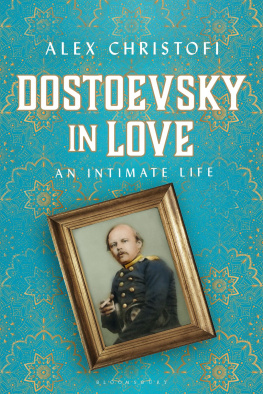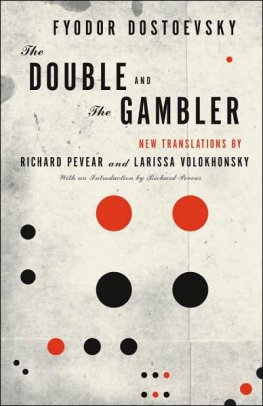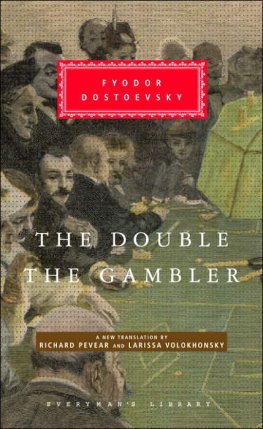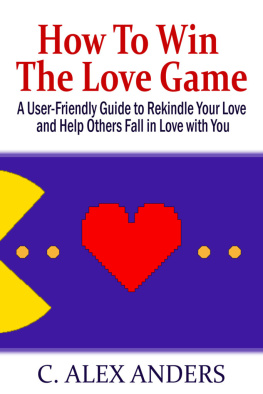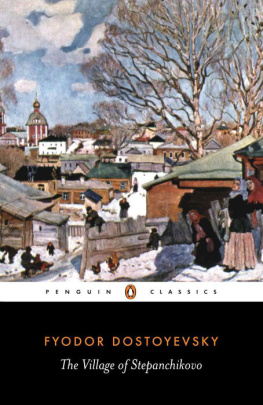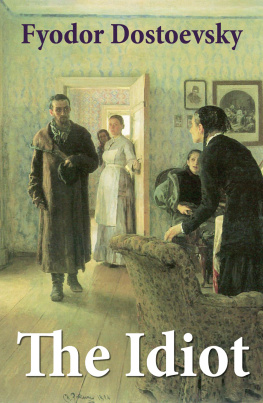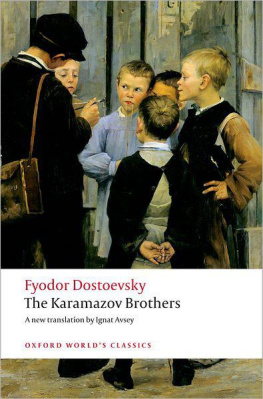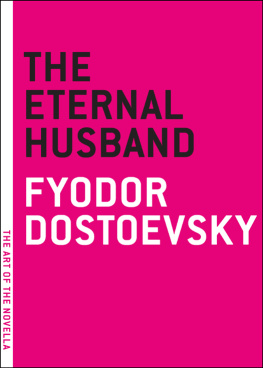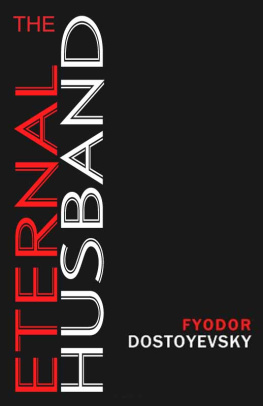Alex Christofi - Dostoevsky in Love
Here you can read online Alex Christofi - Dostoevsky in Love full text of the book (entire story) in english for free. Download pdf and epub, get meaning, cover and reviews about this ebook. publisher: Bloomsbury Publishing, genre: Detective and thriller. Description of the work, (preface) as well as reviews are available. Best literature library LitArk.com created for fans of good reading and offers a wide selection of genres:
Romance novel
Science fiction
Adventure
Detective
Science
History
Home and family
Prose
Art
Politics
Computer
Non-fiction
Religion
Business
Children
Humor
Choose a favorite category and find really read worthwhile books. Enjoy immersion in the world of imagination, feel the emotions of the characters or learn something new for yourself, make an fascinating discovery.
- Book:Dostoevsky in Love
- Author:
- Publisher:Bloomsbury Publishing
- Genre:
- Rating:3 / 5
- Favourites:Add to favourites
- Your mark:
- 60
- 1
- 2
- 3
- 4
- 5
Dostoevsky in Love: summary, description and annotation
We offer to read an annotation, description, summary or preface (depends on what the author of the book "Dostoevsky in Love" wrote himself). If you haven't found the necessary information about the book — write in the comments, we will try to find it.
Dostoevsky in Love — read online for free the complete book (whole text) full work
Below is the text of the book, divided by pages. System saving the place of the last page read, allows you to conveniently read the book "Dostoevsky in Love" online for free, without having to search again every time where you left off. Put a bookmark, and you can go to the page where you finished reading at any time.
Font size:
Interval:
Bookmark:


by the same author
Glass
Let Us Be True

Contents
I owe a huge debt of gratitude to those who helped to make this book possible. First and foremost, to my editor, Jamie Birkett, for trusting me to apply a creative method to a serious biography, and to my agent, Jonny Pegg, and his counterpart Doug Stewart, for helping a novelist sneak onto the non-fiction shelves. A huge thanks also to Richard Mason, Jude Drake, Rosie Parnham, and everyone else who has worked on the book at Bloomsbury.
Im grateful to my academic readers for their invaluable feedback on early drafts of the manuscript. I am a storyteller, not a specialist, and recognise that a scholar might have balked at the idea of writing this book in this way. Any remaining errors are of course my own. To Professor Konstantin Barsht at the Institute of Russian Literature (Pushkin House), for entertaining my suggestion of using spectrophotometry on the portions of Dostoevskys letters that had been inked out by Anna, though they remain a tantalising mystery for now. To Ilona Chavasse for helping me capture the nuances of the correspondence, and for our fascinating conversations about untranslatable Russian words.
Thanks to Louis Brooke, Alex Lawrence-Archer and Rosa Rankin-Gee for letting me hole up elsewhere when I needed to write uninterrupted, and to Samira Shackle and Cal Flyn for moral support when fatigue set in. To Anthony Rowland for accompanying me as I retraced Fyodors footsteps through St Petersburg (though Im still recovering from the Russian policy that drinking vodka without beer is throwing money to the wind). To my family, Chris, Jan, Antony, Mel, Olympia, Adam, Kirsty and Thea. And to Bernadette, who hadnt asked to live with Dostoevsky, and who was almost as patient as Anna.
Such an autobiography as yours might serve as material for a future work of art, for a future picture of a lawless bygone age. When the angry strife of the day has passed, and the future has come, then a future artist will discover beautiful forms for depicting past lawlessness and chaos... They will preserve at any rate some faithful traits by which one may guess what may have lain hidden in the heart of some raw youth of that troubled time.
The Adolescent
The dates in this book are in the Julian old style, which was 12 days behind the Gregorian new style calendar used by western Europe at the time. I have indicated the Gregorian date in parentheses, in references to letters sent from Europe.
30 October 1821 | Fyodor Mikhailovich Dostoevsky born, Moscow. |
27 February 1837 | Fyodors mother, Maria Fyodorovna Dostoevskaya (ne Nechaeva), dies. |
16 January 1838 | Enters the Engineering Academy. |
6 June 1839 | Fyodors father, Mikhail Andreevich Dostoevsky, dies. |
October 1844 | Resigns from the Engineering Academy. |
15 January 1846 | Poor Folk published in Nikolai Alexeevich Nekrasovs Petersburg Miscellany ( Petersburgsky Sbornik ). |
1 February 1846 | The Double published in Notes of the Fatherland ( Otechestvennie Zapiski ). |
23 April 1849 | Arrested for treason. |
22 December 1849 | Mock execution. |
15 February 1854 | Released from prison in Omsk. |
6 February 1857 | Marries Maria Dmitrievna Isaeva in Kuznetsk, Siberia. |
December 1859 | Moves to St Petersburg. |
January 1860 | First issue of the journal Time ( Vremya ), published in collaboration with his brother Mikhail Mikhailovich. |
18601862 | Notes from the House of the Dead published in Russian World ( Russky Mir ) and Time ( Vremya ). |
1861 | The Insulted and Injured published in Time. |
24 May 1863 | Time suppressed by government censors. |
AugustOctober 1863 | Travels in Europe with Apollinaria (Polina) Prokofievna Suslova. |
24 January 1864 | Receives permission to publish his journal under the name Epoch ( Epokha ). |
1864 | Notes from the Underground published in Epoch . |
15 April 1864 | Maria dies in Moscow. |
10 July 1864 | Mikhail dies in Pavlovsk. |
Spring 1865 | Epoch folds. |
1866 | Crime and Punishment is published serially in The Russian Herald ( Russky Vestnik ). |
4 October 1866 | Anna Grigorievna Snitkina begins work as Dostoevskys stenographer. |
15 February 1867 | Marries Anna. |
14 April 1867 | Travels to Europe to escape creditors. |
1868 | The Idiot is published serially in The Russian Herald . |
8 July 1871 | Returns to St Petersburg. |
18712 | Devils is published serially in The Russian Herald . |
1873 | The first articles in A Writers Diary are published in the magazine Dostoevsky is editing, The Citizen ( Grazhdanin ). |
1875 | The Adolescent is published serially in Notes of the Fatherland ( Otechestvennye Zapiski ). |
1876 | A Writers Diary appears as its own publication. |
187980 | The Brothers Karamazov is published serially in The Russian Herald . |
8 June 1880 | Delivers memorial speech at the unveiling of the Pushkin monument in Moscow. |
28 January 1881 | Dies of emphysema. |
1 February 1881 | Funeral held in St Petersburg. |
Why bother writing a book about Dostoevsky? In most portraits, he looks like a grumpy Saint Nicholas (and incidentally, he did spend one Christmas night riding across Russia in an open sleigh). He was such a contrarian that members of both the liberal left and the reactionary right were forever convinced that he was working for the enemy. Unlike many modern readers, he was a deeply committed Orthodox Christian, though he was famously eloquent about spiritual doubt. I know some people find the length of his four best-known novels imposing; perhaps others accept that he was a great philosopher, but dont have the patience for his insistent style, with its repetitions and digressions. He himself admitted, just as he was completing the first of his four great novels: I have been painfully aware for twenty years now that my literary vice is prolixity , but I cant seem to shake it off. All in all, he could be an exasperating man, and yet it seems to me that many of his ideas remain disconcertingly relevant today: the importance of understanding that autonomy and dignity are more precious to us than the rational self-interest of economists; that more people are killed by bad ideas than by honest feeling; that a society with no grand narrative is vulnerable to political extremism. He took great pains to understand the angry young men who were threatening to topple Russia and the rest of Europe in his lifetime, perhaps because he remembered what it was like to be one of them. More than anything else, Dostoevsky was a deeply moral writer, and he refused to turn a blind eye to the suffering he saw among the slaves (for that is effectively what serfs were), the outcasts, the prostitutes, the humiliated, the sick and the silenced of his day. He was fiercely devoted to raising up the downtrodden and giving them a voice. And so, although I will be writing about Dostoevsky as a lover and a husband, I will also be writing about a broader, more inclusive kind of love, which he believed was the only possible answer to suffering in this world.
Font size:
Interval:
Bookmark:
Similar books «Dostoevsky in Love»
Look at similar books to Dostoevsky in Love. We have selected literature similar in name and meaning in the hope of providing readers with more options to find new, interesting, not yet read works.
Discussion, reviews of the book Dostoevsky in Love and just readers' own opinions. Leave your comments, write what you think about the work, its meaning or the main characters. Specify what exactly you liked and what you didn't like, and why you think so.

